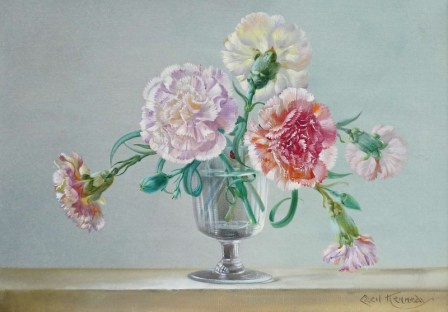Cecil Kennedy
(1905-1997)
Cecil Kennedy was one of the foremost British flower painters, regarded as elevating the genre of still life to its rightful status 'as a complex and thoughtful, as well as aesthetically pleasing' form.
Born into an artistic family - his grandfather, father and four of his uncles were painters - Kennedy was encouraged to paint from a young age. Although initially trained in landscape painting by his father, Kennedy was profoundly affected by his experience as a young soldier posted out to Antwerp during the Second World War. It was here that he not only made close friendships with local artists, but had the opportunity to view first hand the museum collections of the great Dutch and Flemish Masters. From this point onwards, Kennedy actively began to emulate the meticulous technique and exuberant colour palette that he saw, an aesthetic association that influenced his works for his entire career.
At the age of 24 Kennedy began exhibiting at the Royal Scottish Academy and the Royal Hibernian Academy and later at the Royal Academy in London and the Paris Salon. His works were also collected and shown by many eminent private societies and dealers. At the Paris Salon he was awarded a silver medal in 1956 and a gold medal in 1970. Kennedy's works were also shown at the Fine Art Society for almost two decades between 1950 and 1970. Kennedy had many private patrons, including Queen Mary, who suggested that he should always include a ladybird as a form of a seal, the Duke of Windsor and the Astor family.
With his extensive knowledge of botany, Kennedy was fascinated by the compositional and colouristic effects of nature and his paintings revered even the most common of species, such as a grasses, wildflowers and fruits. He also experimented with the difficulties of all white arrangements.
In later life Kennedy's love for flower studies was shared by his wife, Winifred Ives, who assisted him in creating many of the arrangements seen in his works. Following the rapid decline of his eyesight in the late Eighties, Kennedy took the sad decision to stop painting. Almost a decade later, Kennedy died at the age of 92 at home in St Albans.
In a retrospective shortly after his death, Cecil Kennedy was characterised as the 'most exquisitely detailed and artful flower painter of his generation'.
